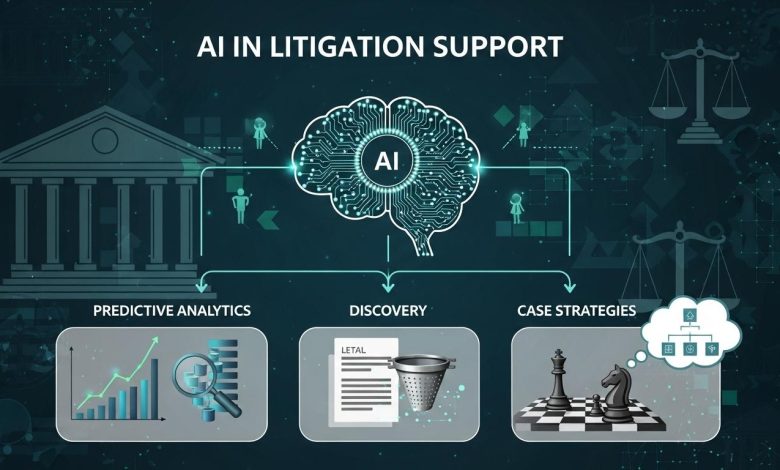
Litigation is often fraught with complexity, uncertainty, and immense data volumes. Law firms worldwide are turning to artificial intelligence (AI) to streamline their litigation workflows, enhance accuracy, and deliver more strategic outcomes for clients. The integration of ai for legal in predictive analytics, eDiscovery, and case strategy represents a significant leap forward, with the potential to transform every phase of litigation. This blog explores how ai legal technology is reshaping litigation support, making legal practices more competitive, scalable, and data-driven.
Understanding AI in Litigation Support
AI-powered support systems use advanced algorithms to analyze case files, identify patterns, and offer actionable insights for legal teams. These tools leverage natural language processing (NLP), machine learning, and predictive analytics to automate and optimize everything from legal research to risk assessment.
Core Components of AI Litigation Support
- Predictive analytics: Analyzes historical case data to forecast outcomes and highlight strategic advantages.
- eDiscovery automation: Sorts, organizes, and prioritizes massive document volumes for relevance.
- Risk assessment: Flags potential risks, liabilities, and strategic opportunities based on past litigation patterns.
- Dynamic case strategies: Provides data-driven recommendations for legal arguments and negotiation tactics.
By deploying ai for legal tools, firms can allocate resources efficiently, identify trends, and support lawyers in making data-informed decisions.
The Role of Predictive Analytics in Litigation
Predictive analytics harnesses statistical modeling, data science, and machine learning to assess and project case results. These tools examine judge tendencies, historical verdicts, and opposing counsel behavior to guide every aspect of litigation planning.
Key Predictive Analytics Applications
- Judicial behavior prediction: AI reviews years of judge rulings to inform argument strategies and brief preparation.
- Outcome estimation: Models the probability of success for specific motions, claims, or cases.
- Settlement forecasting: Estimates potential settlement ranges or likelihood based on precedent patterns.
- Cost analytics: Predicts total litigation costs, facilitating robust budgeting and client proposals.
Lawyers leveraging ai legal analytics are better equipped to anticipate court dynamics, negotiate settlements, and optimize case approaches for favorable results.
Accelerating the Discovery Phase With AI
Discovery is often cited as the most resource-intensive phase of litigation. AI discovery platforms help firms manage immense data volumes, sorting thousands of documents for relevant evidence within hours, not days.
Transformations in Legal Discovery
- Automated document review: AI screens large data sets to find key documents, emails, and correspondence relevant to the matter.
- Smart search and tagging: Machine learning tags, organizes, and indexes files for seamless retrieval.
- Privilege and relevance detection: AI flags privileged, confidential, or highly relevant documents instantly reducing manual review risks.
This level of automation with ai for legal services accelerates pre-trial preparation, eliminates errors, and drastically cuts costs.
Strategic Case Planning Through Data Insights
AI is not just about speed it fundamentally redefines how lawyers build strategies. Advanced litigation tools offer simulations, risk models, and outcome forecasts that reframe legal arguments and tactical choices.
How AI Shapes Case Strategies
- Scenario modeling: Simulates opposition arguments and evidence presentation to test strategy resilience.
- Argument optimization: Evaluates prior cases to pinpoint methods, clauses, or evidence that most often secure favorable outcomes.
- Real-time adaptation: Identifies when new precedents, laws, or facts require strategy adjustments.
- Team collaboration and information sharing: AI-driven platforms track progress, provide task management, and support cross-team alignment.
By adopting ai legal innovations, lawyers focus on high-value work case theory, storytelling, and negotiation while leaving repetitive analysis to reliable digital assistants.
AI in Legal Research and Due Diligence
Legal research underpins every successful case. AI-powered research tools scan vast statutes, case law, and commentary in minutes, providing comprehensive and relevant insights.
Legal Research Improvements With AI
- Automated statute analysis: NLP deciphers and interprets legislative texts, finding citations and supporting precedent rapidly.
- Case law summarization: AI condenses lengthy judicial opinions, delivering essential details to teams.
- Due diligence automation: Historic case data is matched to current issues, clarifying risks, compliance, and opportunities.
Firms embracing ai for legal research achieve faster turnaround, better-informed arguments, and stronger compliance frameworks.
Optimizing Case Management and Operational Efficiency
Litigation support goes beyond analytics and research. AI platforms automate scheduling, reminders, and team communications ensuring deadlines are met and collaboration is seamless.
AI-Powered Case Management Benefits
- Intelligent calendar management: AI predicts process bottlenecks and sets reminders for critical deadlines.
- Team productivity analytics: Dashboards track case progress and lawyer workloads, optimizing resource allocation.
- Workflow automation: Repetitive tasks document sharing, filing, motion tracking are streamlined via AI integrations.
Such operational gains allow firms to deliver consistent, cost-effective results for every client engagement.
Risk Management: Proactive Litigation with AI
Effective risk management is central to litigation success. AI platforms identify litigation red flags early and propose solutions to minimize adverse outcomes.
Risk Mitigation Features
- Early warning systems: AI detects irregularities and risks in case strategy and documentation before escalation.
- Bias identification: Predictive modeling highlights discrepancies and systemic biases in judicial decisions.
- Outcome prediction: Machine learning helps lawyers prepare for motions, mediation, or trial with improved certainty.
Proactive risk management through ai legal systems reduces unexpected challenges and sets the platform for strategic success.
Real-World Impact: AI in Litigation Success Stories
Law firms have publicly reported substantial gains from implementing AI:
- Case outcome forecasting: Firms predict win/loss probabilities and adjust litigation strategies accordingly.
- Settlement negotiations: By leveraging historical data, firms negotiate better settlements for clients.
- Improved team collaboration: Automated reports and analytics ensure all team members are synchronized on strategy adjustments.
These success stories reveal how ai for legal helps firms boost performance, reduce litigation timelines, and improve client satisfaction.
Overcoming Adoption Challenges
While benefits are clear, transitioning to AI in litigation is not without hurdles. Firms must train staff, adjust workflows, and maintain close supervision of AI recommendations.
Common Challenges
- Learning curve: Lawyers and paralegals need time to master AI dashboards and features.
- Data quality: Effective predictive analytics require well-structured historical case data.
- Limits of automation: AI cannot fully replace human judgment, especially in unique or high-stakes cases.
By steadily integrating ai legal tools and investing in education, firms position themselves at the frontier of legal technology.
The Future of Litigation: AI-Driven Strategies
AI will continue to drive deeper transformation in litigation support. Law firms can expect:
- Dynamic simulation tools: Real-time scenario testing and adjustment of litigation strategies.
- Broader access for all firms: Enhanced affordability and functionality for solo and small-scale practices.
- Continuous improvement: Machine learning algorithms refine recommendations as new data becomes available.
- Greater fairness and efficiency: Data-driven systems help minimize bias and ensure equitable outcomes.
As technology evolves, ai for legal will be vital for law firms aiming to lead and innovate in litigation support.
Conclusion
Artificial intelligence is fundamentally changing litigation support, automating discovery, driving predictive analytics, and empowering smarter case strategies for law firms in every region. By investing in ai legal solutions today, forward-thinking firms achieve higher productivity, robust risk management, and greater client value.




